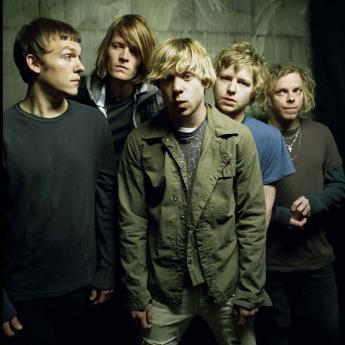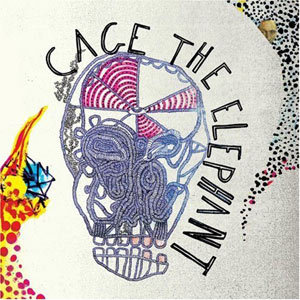 Raised in a mystical Christian commune and confined to Gospel music, Cage The Elephant’s five young members grew up uninformed about even the most basic indie punk bands. When singer Matt Shultz’s parents finally found out he had a Green Day cassette, they destroyed it, finding the rebellious trio offensive. But Matt and his pals soon broke free of their parents’ tight grip and prevailed, discovering the invigorating joy of the Ramones, Bad Brains, Black Flag, Butthole Surfers, Pixies, Mudhoney, and Nirvana. They learned to play hard and eventually got to open for Queens Of The Stone Age, a prestigious beginning, indeed.
Raised in a mystical Christian commune and confined to Gospel music, Cage The Elephant’s five young members grew up uninformed about even the most basic indie punk bands. When singer Matt Shultz’s parents finally found out he had a Green Day cassette, they destroyed it, finding the rebellious trio offensive. But Matt and his pals soon broke free of their parents’ tight grip and prevailed, discovering the invigorating joy of the Ramones, Bad Brains, Black Flag, Butthole Surfers, Pixies, Mudhoney, and Nirvana. They learned to play hard and eventually got to open for Queens Of The Stone Age, a prestigious beginning, indeed.
Growing up in Bowling Green, Kentucky, 45-minutes north of Nashville, Cage The Elephant’s big break came when major label, Jive Records, signed them. By sending them off to England for a year to promote ‘08s promising self-titled debut, the quixotic quintet quickly realized they’d also missed out on several outstanding new wave and ska bands that never got a fair chance in America, such as Gnag Of Four, English Beat, and The Jam.
Fronted by the wily Matt Shultz, Cage The Elephant includes his brother, guitarist Brad Shultz, and long-time pals Lincoln Parish (guitar), Daniel Tichenor (bass), and Jared Champion (drums). Together, they concoct a potpourri of stylistically diversified rock, representing musical ‘food’ groups from Cake to Phish to Red Hot Chili Peppers and beyond.
 Painting a grim picture of hard time white-boy blues, Matt ain’t no ‘phony in disguise/ tryin’ to make the radio.’ Up-front, his Dylan-influenced raps dig deep into the heart of each song’s matter. He’s ‘talkin’ shit’ on rousing ‘60s-psych powered anthem, “In One Ear,” criticizing our compromised culture with the soaring engine-driven rampage, “Tiny Little Robots,” and summoning R & B great, “James Brown,” for a full-on rocker indubitably usurping Johnny Rotten’s underclass lyrical drawl. The funky reserved-to-explosive Chili Peppers-spiked corruption underlying the snappy choral charge of “Lotus” leads to the soothing guitar groove and addictive half-rapped refrain summoning Cage The Elephant’s most accessible number, “Back Against The Wall.” When those two funky wafts recede, it’s the smell of death that consumes anguished paean, “Drones In The Valley,” where buzzy 6-string riffs unintentionally cop to Billy Squier’s metal-pop ditty, “Everybody Wants You.”
Painting a grim picture of hard time white-boy blues, Matt ain’t no ‘phony in disguise/ tryin’ to make the radio.’ Up-front, his Dylan-influenced raps dig deep into the heart of each song’s matter. He’s ‘talkin’ shit’ on rousing ‘60s-psych powered anthem, “In One Ear,” criticizing our compromised culture with the soaring engine-driven rampage, “Tiny Little Robots,” and summoning R & B great, “James Brown,” for a full-on rocker indubitably usurping Johnny Rotten’s underclass lyrical drawl. The funky reserved-to-explosive Chili Peppers-spiked corruption underlying the snappy choral charge of “Lotus” leads to the soothing guitar groove and addictive half-rapped refrain summoning Cage The Elephant’s most accessible number, “Back Against The Wall.” When those two funky wafts recede, it’s the smell of death that consumes anguished paean, “Drones In The Valley,” where buzzy 6-string riffs unintentionally cop to Billy Squier’s metal-pop ditty, “Everybody Wants You.”
Making use of the fairly spacious Zumiez Stage at Bamboozle, Cage The Elephant motivated the appreciative audience to join in. Matt jumps into the crowd, mike in hand, to get the party started during a booming hardcore opener (presumably a new tune). He then lets out another loudly yelped rip-snorting punk-inspired discharge, working his mojo, prancing ‘cross the stage, nodding his head, eyes closed, mouth gaping, and dropping to his knees pleading for vindication as perspiration drips off his reddish tanned face. Lincoln’s Appalachian Blues riffs introduce “Ain’t No Rest For The Wicked,” where Matt’s anxiety-charged rap lays it all on the line. A banged-up slam-dunk version of “In One Ear” got fans clapping along freely, without the band having to urge them on. On top of that, fresh cut, “Sabre Tooth Tiger,” contained a catchy ‘run away’ chorus that rode above the scrambling guitar furor and rumbling bass clusters.
Cage The Elephant may be musically adventurous and profusely intuitive, but safely within the limits of orderly constructed folk-rock-blues schemes. At the core, they maintain cohesive song structures while avoiding wasteful jamming and distended solos. It’ll be interesting to see how these Christian-schooled Bluegrass State natives make out in the long haul and which musical directions lie ahead.
Recently, Cage The Elephant headed back to the studio to begin work on a second long-player. Matt claims “We’ve progressed as people. The newer songs are more melody-driven and have a positive vibe. We feel better about them.”
I spoke to the 25-year-old Matt and guitarist Lincoln Parish inside Giant Stadium while music blared in the parking lots’ collapsible stages during May ‘09s Bamboozle Festival.
How did Cage The Elephant come together?
MATT SHULTZ: Me, Brad, and Jared were in a high school band. After graduation, the lead guitarist and bassist quit to pursue college. Lincoln came along to jam and our bassist, Dan, just showed up at practice with a bass and amp before he even knew how to play.
You seem to write about sad characters a lot.
I write about people because I’m around them a lot. Bob Dylan’s a big inspiration, as well as John Lennon, Kurt Cobain, and Frank Black. A lot of times people want to blame the state of society on the government. They control groups of people looking at themselves for a lack of self-control – manipulation. A lot of our songs are written about people ‘close to decay.’ We tend to make them into riddles more than straightforward stories.
“Judas” seems to rip apart greedy Satan-like gunslingers. And I notice it’s presciently followed by the knife-wielding “Back Stabbin’ Betty.”
“Judas” isn’t about any particular person. It’s more about the mentality of someone who loves money more than anything else and will pursue it at all costs. “Betty’s” a personal story…
Are you ripping on Generation X on “In One Ear”?
No. I wouldn’t be ripping on them. It’s about people who live in the shadows talking behind people’s backs – like Chinese Whispers.
Your rap flow on “Tiny Little Robots” reminded me of Everlast.
Many people ask about my raps and where they come from. It’s more Dylan’s “Subterranean Homesick Blues” –‘mom’s in the basement/ mixing up the medicine/ I’m on the pavement/ thinkin’ ‘bout the government.’ That’s where the rhythmic flow comes from. I’ve never been a huge hip-hop fan. I like some of it though.
Some of your nifty song ideas remind me of the band Cake. And the mini-improvisations could be informed by Phish.
I love Cake. I’m not a huge Phish fan, but I respect what they’re doing. They’re phenomenal musicians. I’ve always been more of a songwriting musician like the Beatles, Pixies, and Nirvana. They were terrific writers. I could always respect people who have a gift or talent for improvisation, but I like a well-crafted song. And Dylan’s one of the greatest songwriters of all time.
Lincoln, who were you influenced by?
LINCOLN PARISH: Growing up in Bowling Green, we weren’t exposed to a lot of different music, just Led Zeppelin, Pink Floyd, Chuck Berry, Little Richard, James Brown. But when we moved to England, we got into Gang Of Four and the Pixies. I really like old Delta Blues – Robert Johnson and Blind Lemon Jefferson.
How do the arrangements for Cage The Elphant’s songs usually come to fruition?
We’ll basically take inspiration from everywhere. Sometimes I’ll write something, bring in a guitar part. I try to work a melody in. Every song is different. Some songs take time. Others, like “Back Stabbin’ Betty,” we recorded that song in one take on the first day. That was one of the rare songs we wrote with everyone there. The thing we always loved about great art was the element of surprise. Being able to take it to different places and create landscapes, textures, and tones. There’s so much input going into each of our songs from constant individual inspiration.